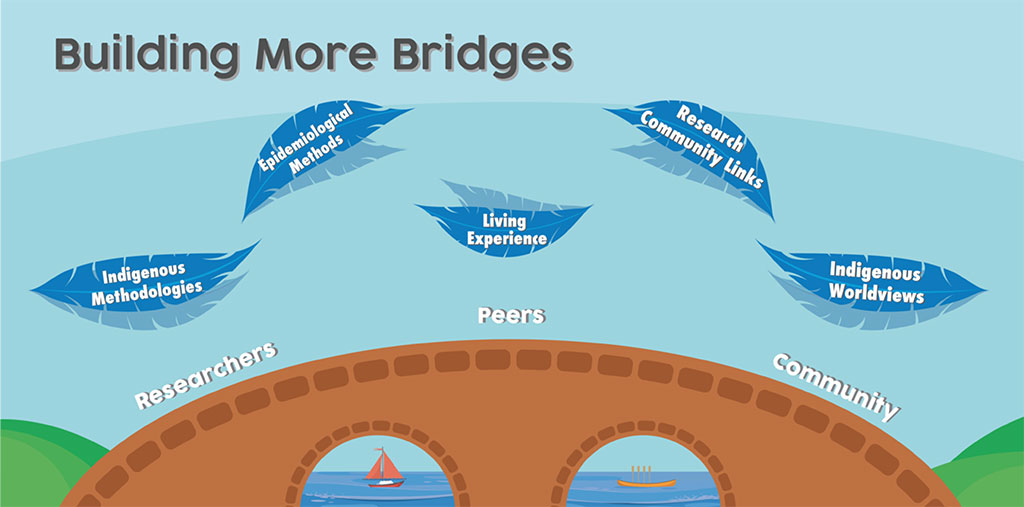Indigenous Circles Through the Black Box of Big Data; Bridging, Building, Sharing and Connecting Research Together
This project aims to establish the Building More Bridges in Big Data Partnership by building a team of Elders, Peer Indigenous Co-Researchers, Indigenous community members, knowledge brokers, non-Indigenous researchers, clinicians, and relevant stakeholders to develop recommendations/best practices for big data HIV research that is in line with key ethical issues of Indigenous data sovereignty, self-determination, ownership and justice.
- When using large, linked datasets for health research, it is crucial to engage communities in the research process in order to meaningfully address the public’s needs. This is particularly important when engaging Indigenous communities, seeing that:
- There is a need to understand the historical and ongoing impacts of colonialism
- It is crucial to acknowledge the strengths in Indigenous peoples’ knowledges and experiences while advocating for Indigenous leadership and self-determination in research.
STUDIES MENU
Goals
- To establish a partnership by building a team of Elders, Peer Indigenous Co-Researchers (who are Indigenous People Living with HIV [IPLHIV]), Indigenous community members, knowledge brokers, Indigenous and non-Indigenous researchers, clinicians, and health policy decision makers (in relevant fields spanning big data science (BDS), epidemiology, Indigenous research methods, and bioethics)
- To develop guidelines/best practices for BDS HIV research in line with key ethical issues of Indigenous data sovereignty, self-determination, ownership, and justice, by engaging the Building More Bridges in Big Data team and honoring and respecting Two-Eyed Seeing guiding principles
Goals
- To establish a partnership by building a team of Elders, Peer Indigenous Co-Researchers (who are Indigenous People Living with HIV [IPLHIV]), Indigenous community members, knowledge brokers, Indigenous and non-Indigenous researchers, clinicians, and health policy decision makers (in relevant fields spanning big data science (BDS), epidemiology, Indigenous research methods, and bioethics)
- To develop guidelines/best practices for BDS HIV research in line with key ethical issues of Indigenous data sovereignty, self-determination, ownership, and justice, by engaging the Building More Bridges in Big Data team and honoring and respecting Two-Eyed Seeing guiding principles
Learnings & Discussions
- Approach: Building More Bridges in Big Data team members will come together to discuss how ethical concepts of Indigenous data sovereignty, Indigenous self-determination, and justice for Indigenous peoples should guide the development and implementation of BDS HIV research; how these concepts can guide the adaptation or creation of guidelines/best practices for researchers, policy makers, and community using BDS for HIV research; and the limitations of potential guidelines/best practices, i.e. what ethical issues may not be fully addressed. The Gatherings will be developed in partnership with Elders and will respect context-specific knowledge, methods, wisdoms, and ceremony.
- Indigenous methodologies: we draw on the work of Trawlwoolway scholar, Maggie Walter, and Métis scholar, Chris Anderson, who present Indigenous quantitative methodologies as ones that challenge and resist colonizing frameworks embedded in research by privileging the voices, knowledges, and worldviews of Indigenous peoples in defining research questions, constructs, variables, and themes.

